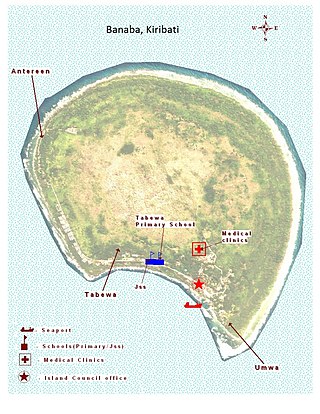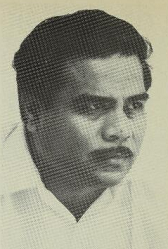Related Research Articles

Kiribati, officially the Republic of Kiribati, is an island country in Oceania in the central Pacific Ocean. The permanent population is over 119,000 (2020), more than half of whom live on Tarawa atoll. The state comprises 32 atolls and one remote raised coral island, Banaba. There is a total land area of 811 square kilometres dispersed over 3.5 million km2 (1.4 million sq mi) of ocean.

The islands which now form the Republic of Kiribati have been inhabited for at least seven hundred years, and possibly much longer. The initial Austronesian peoples’ population, which remains the overwhelming majority today, was visited by Polynesian and Melanesian invaders before the first European sailors visited the islands in the 17th century. For much of the subsequent period, the main island chain, the Gilbert Islands, was ruled as part of the British Empire. The country gained its independence in 1979 and has since been known as Kiribati.

Politics of Kiribati takes place in a framework of a parliamentary representative democratic republic, whereby the Beretitenti, President of Kiribati, is both the head of state and head of government, and of a multi-party system. Executive power is exercised by the government, Beretitenti, and his cabinet, all MPs. Legislative power is exercised by the House of Assembly. The Judiciary of Kiribati is independent of the executive and the legislature. The Constitution of Kiribati, promulgated at independence on 12 July 1979, establishes the Republic of Kiribati as a sovereign democratic republic and guarantees the fundamental rights of its citizens and residents.

The first inhabitants of Tuvalu were Polynesians, so the origins of the people of Tuvalu can be traced to the spread of humans out of Southeast Asia, from Taiwan, via Melanesia and across the Pacific islands of Polynesia.

The Gilbert Islands are a chain of sixteen atolls and coral islands in the Pacific Ocean, about halfway between Papua New Guinea and Hawaii. They constitute the main part of the nation of Kiribati.

The Gilbert and Ellice Islands in the Pacific Ocean were part of the British Empire from 1892 to 1976. They were a protectorate from 1892 to 12 January 1916, and then a colony until 1 January 1976. The history of the colony was mainly characterized by phosphate mining on Ocean Island. In October 1975, these islands were divided by force of law into two separate colonies, and they became independent nations shortly thereafter: the Ellice Islands became Tuvalu in 1978, and the Gilbert Islands became part of Kiribati in 1979.

Banaba is an island of Kiribati in the Pacific Ocean. A solitary raised coral island west of the Gilbert Island Chain, it is the westernmost point of Kiribati, lying 185 miles (298 km) east of Nauru, which is also its nearest neighbour. It has an area of six square kilometres (2.3 sq mi), and the highest point on the island is also the highest point in Kiribati, at 81 metres (266 ft) in height. Along with Nauru and Makatea, it is one of the important elevated phosphate-rich islands of the Pacific.

Ieremia Tienang Tabai is an I-Kiribati politician who served as the first Beretitenti President of the Republic of Kiribati, after being the youngest ever Chief minister of the Commonwealth of Nations and then becoming the youngest ever head of State. During his presidency, he was described as being the most able leader of the Pacific island states.

Tarawa is an atoll and the capital of the Republic of Kiribati, in the Micronesia region of the central Pacific Ocean. It comprises North Tarawa, which has 6,629 inhabitants and much in common with other more remote islands of the Gilberts group, and South Tarawa, which has 56,388 inhabitants as of 2015, half of the country's total population. The atoll was the site of the Battle of Tarawa during World War II.

The British Western Pacific Territories (BWPT) was the name of a colonial entity, created in 1877, for the administration, under a single representative of the British Crown, styled High Commissioner for the Western Pacific, of a series of Pacific islands in and around Oceania. Except for Fiji and the Solomon Islands, most of these colonial possessions were relatively minor.

The House of Assembly is the Legislature of Kiribati. Since 2016, it has 45 members, 44 elected for a four-year term in 23 single-seat and multi-seat constituencies and 1 non-elected delegate from the Banaban community on Rabi Island in Fiji. From 1979 to 2016, the Attorney general was an ex officio member of the legislature, until a change of the constitution modified this provision.

Nikunau is a low coral atoll in the Gilbert Islands that forms a council district of the Republic of Kiribati. It consists of two parts, with the larger in the northwest, joined by an isthmus about 150 metres (490 ft) wide.
A referendum on separating from the Gilbert Islands was held in the Ellice Islands between July and September 1974. A rolling ballot was used, starting in July in Tarawa in the Gilbert Islands before being taken to each resident of the Ellice Islands.
General elections were held in the Gilbert and Ellice Islands on 19 March 1971.
General elections were held in the Gilbert and Ellice Islands on 4 April 1974. All candidates ran as independents.

Te Reuben Kiraua Uatioa was a Gilbertese politician. After being elected to the House of Representatives in 1967, he became the first Chief Elected Member of the Gilbert and Ellice Islands colony and then Leader of Government Business, serving until unexpectedly losing his seat in 1974. He then served as Speaker of the House of Representatives until 1975.
Sione Tui Kleiss was a Tuvaluan civil servant, priest and politician. He was a member of the legislature of the Gilbert and Ellice Islands from 1967 until the Ellice Islands separated in 1975, also serving as Minister for Commerce and Industry. Following the separation, he became a member of the Tuvalu House of Assembly and served as its Speaker.
Bwebwetake Areieta was an I-Kiribati politician. He served as a member of the Legislative Council and House of Assembly from 1971 until his death, also holding the posts of Member for Social Services and Minister of Communications, Works and Utilities during the 1970s.

Naboua T. Ratieta was an I-Kiribati politician who became the first Chief Minister of the Gilbert and Ellice Islands in 1974. The Ellice Islands separated from the colony the following year, and he remained Chief Minister of the Gilbert Islands until 1978. He also served as an MP from 1968 until his death.

Roniti Teiwaki is an I-Kiribati politician.
References
- ↑ Decolonization United Nations, July 1979
- 1 2 3 Top post for outstanding Gilbertese Pacific Islands Monthly, February 1968, p71
- 1 2 Howard Van Trease (1993) Atoll Politics: The Republic of Kiribati, p8
- ↑ Barrie Macdonald (1971) Policy and practice in an atoll territory: British rule in the Gilbert and Ellice Islands, 1892 – 1970
- ↑ People Pacific Islands Monthly, November 1968, p116